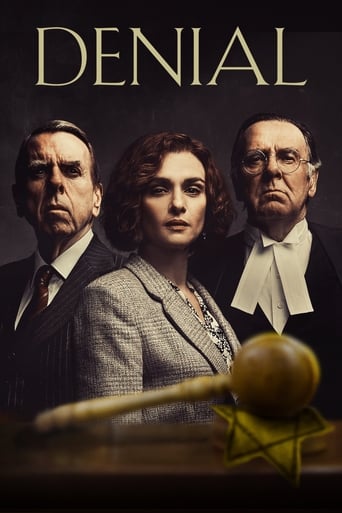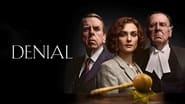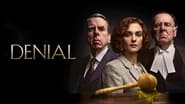sddavis63
It's strange to say this, but "Denial" is Timothy Spall's movie. Strange because the movie is based a book by American historian Deborah Lipstadt on the libel trial launched by British amateur historian David Irving against herself and Penguin Books. Irving was played by Spall. The trial was launched because Irving claimed that Lipstadt had libelled him in a book she had written. Irving was a Holocaust denier, and Lipstadt a Jewish academic who specialized in the Holocaust. Given that the movie is based on Lipstadt's book you expect her to be the focal point, but Irving - in spite of his noxious anti-semitic views - was really the more compelling character, largely because of how well Spall did with the part. Rachel Weisz took on the part of Lipstadt. She was fine in the role, but outshone by Spall.After an opening encounter between the two in Atlanta, where Lipstadt was speaking, most of the movie is set in a British courtroom. You do learn some of the finer points in British law - such as that in the UK it's the defendant in a libel trial that has to prove the case. Irving launched the case in the UK for that very reason. You also see in Lipstadt just a wee bit of the "ugly American" from time to time - such as her refusal to bow to the judge when her trial begins, because- as she said - "I'm an American." Maybe - but too bad. You're in a British court! (She did bow to the judge eventually.) There are some ugly anti-semitic demonstrations portrayed outside the courtroom.The presentation of the case by Lipstadt's legal team is fairly dry and technical. It's interesting from a historical perspective - but you really have to have an interest in history to appreciate some of the finer points. I do have a Bachelors degree in history, so found it interesting to watch as Lipstadt's legal team and various witnesses pull Irving's views apart. But I would say that overall the movie isn't especially engrossing. It's a good movie. It's an important subject. Even aside from the Holocaust, it does deal with the question of when and whether there should be limits on freedom of speech. It's certainly worth watching, but it's certainly not an American-style courtroom drama filled with suspense. (6/10)
classicalsteve
"Denial" centers on a Hitler "scholar", David Irving, a British author who has consistently denied the Holocaust, and his lawsuit against American historian Deborah Lipstadt. To be fair, Irving was among several scholars who refuted the authenticity of the so-called "Hitler Diaries" which were revealed by the German periodical "Stern" in the early 1980's. While Irving has brought to light many interesting facts about the Nazis and Adolph Hitler, he has repeatedly stated in his books he doesn't believe the Holocaust occurred on the widespread scale which is generally accepted by mainstream historians. Lipstadt published a book "Denying the Holocaust" in which she refers to how Irving and other deniers misrepresent history and facts to perpetuate their erroneous conclusions about the Holocaust. The trouble is, Irving wants it both ways. He wants to deny the Holocaust and yet be recognized by other scholars and historians. In short, he wants the keys to the academic washroom. He brought the lawsuit against Lipstadt because, in some sense, her books which referred to his denial of the Holocaust as bogus history was denying him the keys to the washroom. Lipstadt is a bona fide and recognized scholar, and her criticisms of Irving deny him entry into the exclusive club. The film is about Irving's attempt to debunk the criticisms of a fellow scholar and in some sense legitimize a debate about whether or not the Nazis systematically gassed Jews and other minorities labeled as "degenerate" by the German government in the late 1930's and 1940's.Timothy Spall in an Academy-Award caliber performance plays David Irving, author and Holocaust denier who sues Deborah Lipstadt (Rachel Weisz). Tom Wilkinson is convincing as Lipstadt's British libel lawyer. The film begins at a lecture concerning the Holocaust offered by Lipstadt and Irving interrupts the proceedings, claiming he has filed a lawsuit against the speaker. Instead of settling out of court, Lipstadt resolves to defend herself. She hires a law firm whose cracker jack defense attorney is Richard Rampton. To prepare, they not only visit one of the Auschwitz camp sites but painstakingly go through Irving's books to see if he uses propaganda and deception to further his assertions that the Holocaust as portrayed by history is a fallacy.An horrific episode in the annals of human history involved Germany whose government was controlled by right-wing radicals, the National Socialist German Workers' Party, better as the Nazi Party, and their supreme leader, Adolph Hitler. The Nazis with Hitler at the helm instigated what is known as the "Final Solution to the Jewish Problem", a systematic extermination of Jews and those of Jewish heritage, defined as an individual as having one grandparent or closer being Jewish. Millions of Jews and other ethnicities such as Gypsies, Poles and other Eastern Europeans were forced into concentration camps where many gassed or suffered other heinous indignations. At the same time, Germany was fighting the Western Allies in the Second World War. When the war ended, many of the camps were liberated, such as those collectively called Auschwitz, and the inmates told horrific stories of unimaginable torture and execution.Over the many decades since the end of the Second World War, there have been a small but vocal group of so-called "historians" who have tried to tell and sell a different picture of the war. They claim the interment and execution of Jews and other ethnicities by the Nazis, called "The Holocaust", did not actually happen. They agree that inmates were interred in camps, but their captivity was intended for expulsion, not for extermination. They refer to the accepted fact of the Holocaust as a large propaganda hoax perpetrated by Jews.
History is not always a pretty picture. But if we deny history, especially the horrific episodes, we deny who we are today and who we can become. While the real Lipstadt did not agree with Germany's government desiring to put Irving in jail for 3 years for denying the Holocaust, it is extremely important that we understand real history to the best of our abilities. We can help prevent a holocaust from occurring in the future only if we acknowledge the reasons for holocausts of the past, which entail knowing and understanding how and why they happened. It is interesting that the Jewish Holocaust and Holocaust Denial seem to have common enemies: Jews. Just about all Holocaust Deniers are Anti-Sematic. Is this a coincidence?
ritera1
I recently submitted a review of this title. Being that it's a film about a Holocaust denier, I was shocked to see that you've allowed many negative reviews to be posted that are clearly Holocaust deniers. My review was not that. Quite the opposite. I did comment on all those reviews and the stupidity of such views. But I did ask the question why these are made, being that they don't do well and I believe water down the horrid events that took place.Very disappointed in IMDb's hypocrisy.
rogerdarlington
When British history writer David Irving sued for libel the American historian and academic Deborah Lipstadt, because she had accused him of being a Holocaust denier, I assumed that he had no chance of winning and that, having been defeated in a court of law, the cause of Holocaust denial would be irredeemably damaged. I was wrong on both scores which is why, 17 years after the trial, it is so important that this big name film about the case has been made.As the film makes clear, Irving's defeat was far from certain because, in an English libel case, the defendant has to prove the veracity of the offending material and an important part of the price paid by the defence was that neither Lipstadt nor Holocaust survivors were called to testify so that Irving, who conducted his own case, could not exploit them. The film is released at a time when social media online and Trump in the White House are giving extraordinary prominence to falsehoods in an era which has been dubbed "post-truth".The Holocaust happened and, if this film helps to remind people of this incontrovertible fact, it will make a valuable contribution to evidence-based discourse. The main problem for such a cinematic work of less than two hours is that the case was so prolonged and complex. It ran for five years (2000-2005) and, when it came to trial, it went on for 32 days and ended with a judgement of 355 pages. A further problem is that the viewer always knows the outcome, which inevitably diminishes the tension of the narrative, although director Mick Jackson and writer David Hare do their best to build up a sense of uncertainty. So, as a film, this is never going to be a crowd-pleaser.But it tells an important story about an issue of huge historical significance and it does it with a roster of fine British actors. Rachel Weisz (herself Jewish) is the feisty Lipstadt and Timothy Spalling is convincing in the unsympathetic role of Irving, while Tom Wilkinson is formidable barrister Richard Rampton and Andrew Scott is cerebral solicitor Anthony Julius. Some of my Jewish friends feel that the film is unfair to the British Jewish community, but a good deal of research went into this work and every word that Irving utters during the screen version of the trial is taken verbatim from the court records.






